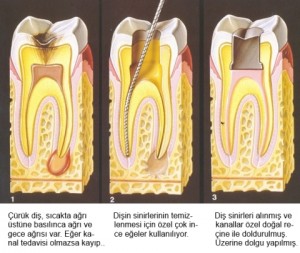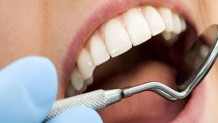Root Canal Therapy

The purpose of Root canal therapy is to clean the entire contaminated portion of a tooth in bad condition, which might potentially be lost due to decay, to ensure such tooth to serve longer and to prevent further treatment, which might be required due to tooth loss and be a burden for you, both financially and psychologically.
The tooth saved as a result of root canal therapy would continue to help chewing at that particular area, therefore keep the respective jawbone in active state and prevent jawbone loss and deterioration.
This complicated and challenging treatment is usually preferred for overly advanced decays
FREQUENTLY ASKED QUESTIONS ON ROOT CANAL THERAPY
Why root canal therapy?
– In fact, toothache usually accompanies only the advanced tooth decay. Many minor decay may have developed in teeth of persons who do not feel any toothache. In case an untreated tooth exists in one’s mouth, the decay in such tooth would advance and reach the lively part (dental pulp) and a throbbing toothache would start, also triggered by contacting hot food and beverages.
– At this stage, removal of dental pulp is the best treatment. The tooth, saved by the removal of the source of bacteria causing such decay, would continue to serve you for long years.
Would root canal therapy cause pain?
– Usually, patients applying to dental clinics for root canal therapy already suffer some degree of pain. As in all dental treatments, root canal therapy is also made under local anesthesia. Normally, you would feel a readily noticeable relief right after the first anesthetic implementation.
– The toothache would almost disappear since the dental nerves are removed during the first treatment session.
Is root canal therapy time consuming?
– This therapy can be completed in one single session if your tooth is not infected. However, infection would prolong the treatment period.
How is root canal therapy performed?
In short, root canal therapy is the process where dental nerves within the tooth are removed and restored with filling material. Dentists use special tools to remove dental nerves and again, fill the emptied canals with special materials.
Can I use my root canal treated tooth as I always used to?
– You may continue to use your treated tooth as usual, however, the tooth would not be fed as before since the capillary vessels and nerves within have been removed.
– Therefore, the cleaned tooth shall weaken and become fragile as a dried tree. Our experiences reveal that teeth not crowned shortly after the root canal therapy can be lost in near future due to cracking and breaking. So, the ideal way would be to crown your root canal treated teeth right after the treatment.




COMMENTS
POST A COMMENT